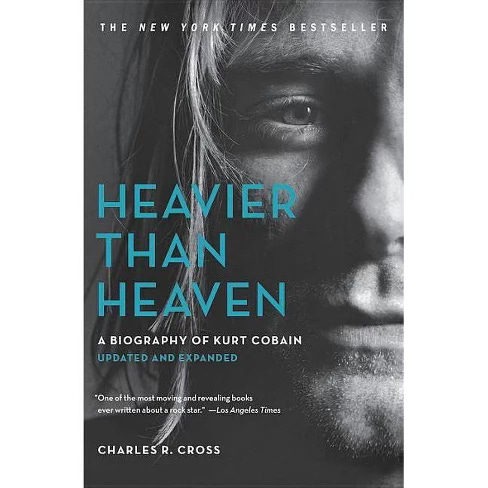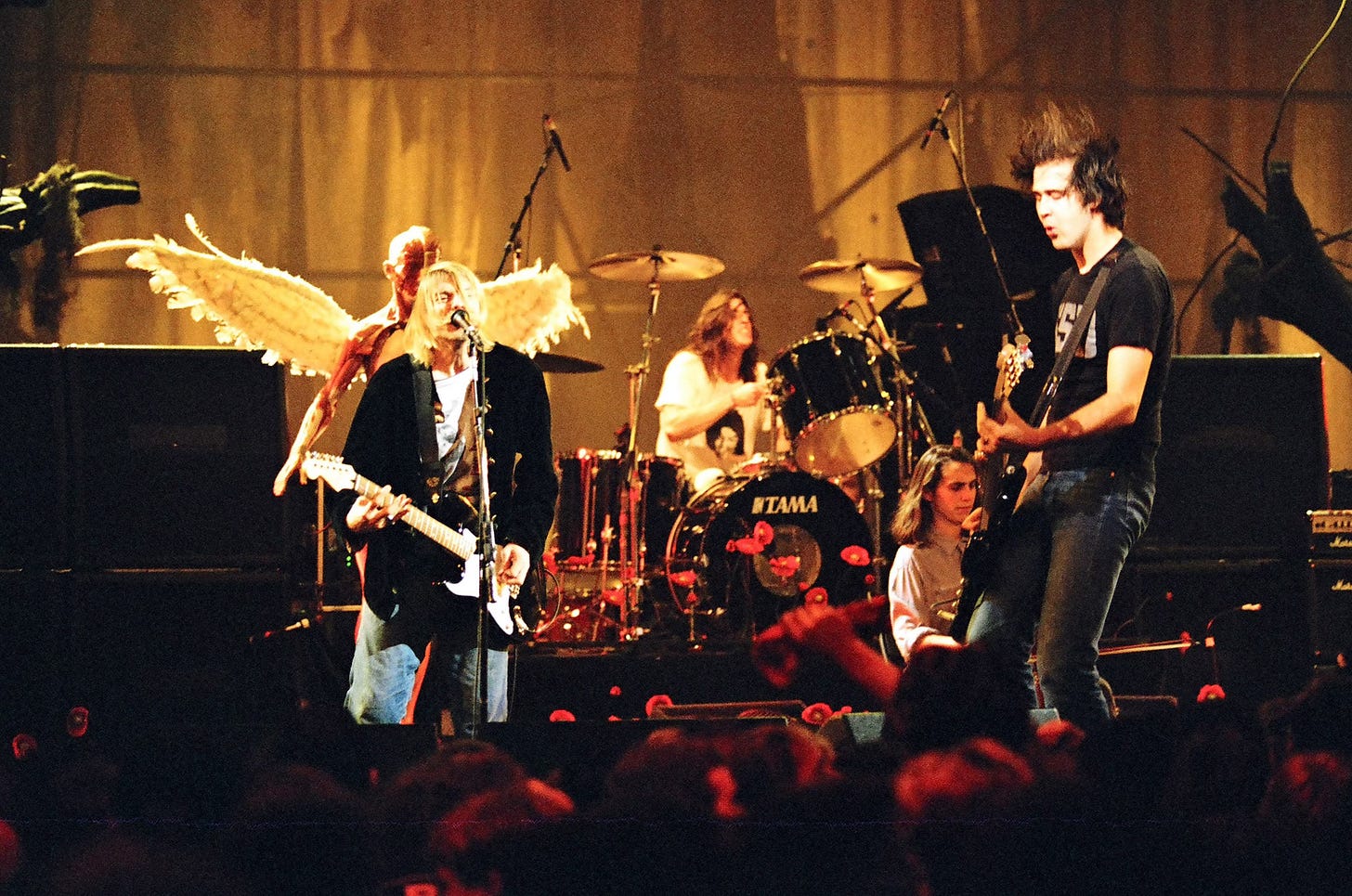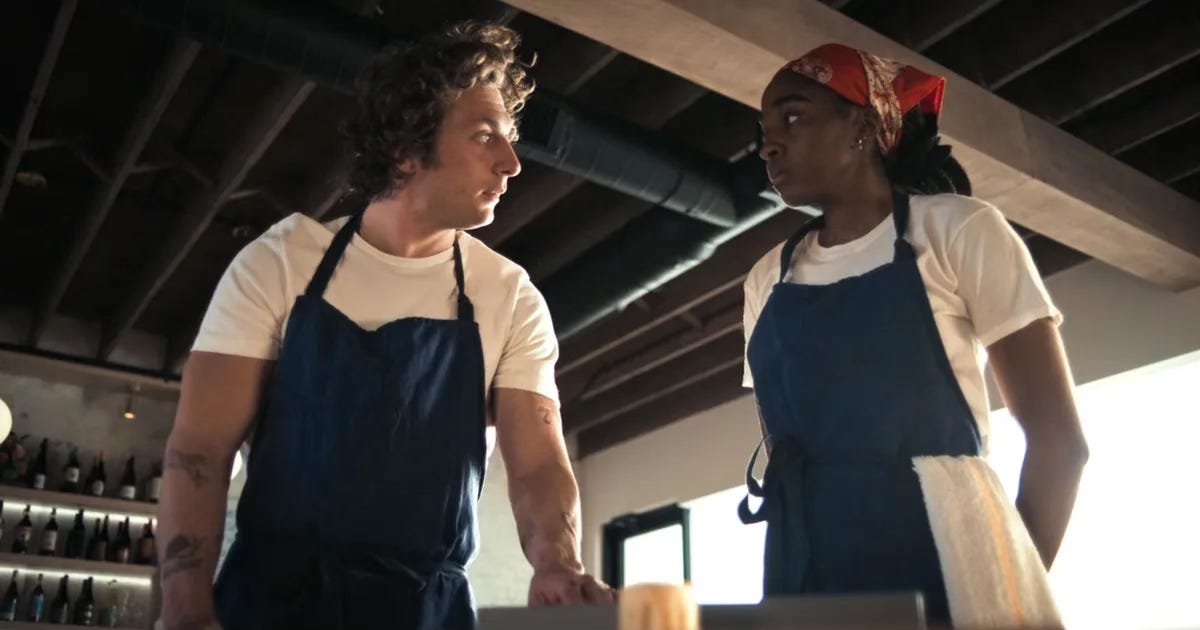Here we are now, entertain us.
Quick thoughts on some of what I've been reading and watching recently.
My binging of Rob Harvilla’s 60 Songs That Explain the 90s podcast made me want to go back and think about Nirvana. Of course, I knew the basic history of the group and its frontman, Kurt Cobain. But I didn’t know all the specifics, so I decided to start reading Charles Cross’ 2001 book Heavier Than Heaven: A Biography of Kurt Cobain. Cross, a famous rock writer and biographer who passed on in 2024, chronicles Cobain’s life from beginning to tragic end. Much of the Cobain/Nirvana narrative was familiar to me, a story I knew because I came of age in the aftermath of grunge (and I remember the moment itself; for example, I do remember hearing the news that Kurt Cobain had died).
While the broad strokes of the story were familiar to me, many of the details weren’t. For example, I didn’t realize how much addiction played a role in Cobain’s life even before his ascendancy to rock stardom. Again, I knew drug use/abuse was something that plagued Cobain along with his wife, Courtney Love, but I didn’t realize the exact timeline.
The conflict within the band itself, though perhaps not surprising, was something I never acknowledged or realized was there. Given how reverently the other members of Nirvana (Dave Grohl and Krist Novoselic) regard the legacy of the band, it came as something of a shock to me. Again, given the nature of the band, its history, and the temperament of Cobain, it’s perhaps not a shock that there would be this degree of acrimony. But at least as I remembered it, Cobain’s suicide brought things to a screeching halt when in reality (at least for Nirvana as a group) they had already halted.
The limited presence of Grohl in Heavier than Heaven was somewhat shocking, particularly given what he would go on to become (I’m thinking about picking up his memoir very soon). I was expected to read and hear more about the future Foo Fighters frontman, but instead he was very much a blip on the radar. The band’s (or at least the “classic” lineup aka with Grohl) limited time as a true live, touring act was also kind of shocking to consider.
One thing Cross emphasizes is that, despite Cobain’s posturing of not caring about success etc etc, he was someone who wanted to do and make something big. This was not totally new to me—I knew, for instance, of Cobain’s real love and appreciation for the Beatles. I mean, you can hear it in his music. Cross makes it clear that Cobain and Nirvana are in a lineage, not something completely isolated. That doesn’t take away from Nirvana’s greatness or somehow saying they weren’t out-of-the-ordinary or important. On the contrary, grasping how Cobain and co. took the more “classic” elements of rock music and then distorted them makes their work all the more impressive.
Heavier than Heaven is an engaging, thoughtful biography and especially powerful when it came to issues of mental health, addiction, depression, and suicide. Just as there were parts of Cobain’s story that were frustrating, and parts that made you roll your eyes, there were also many parts that moved you.
I need a chance, a second chance, a third chance, a fourth chance
I’ve, a bit belatedly, made my way through season 2 of The Bear and I’m currently in season 3. I know this isn’t some like… ground-breaking discovery as it’s one of the most popular and well-regarded shows out there. My saying I’m enjoying it doesn’t exactly set me apart. But still, it’s really good! As, well, as someone who’s been enjoying this latest album by The Cure as an example, it’s kind of an ideal show for me. To be certain, the music choices—the prevalence of Pearl Jam, Wilco, and the recurring use of “Strange Currencies” by R.E.M.—have played a role in my love for the show. But that’s certainly not the only reason.
The Bear, being a show about restaurants and cooking and set in that world, feels very familiar given how much time I’ve spent tangentially being a part of the bar/bartender/cocktail world. I know these people, I’m friends with these people, I’ve moved through kitchens and behind bars.
I’ve also seen the show compared to my favorite show of all time, Mad Men. I think it is an apt comparison. The Bear is both dramatic and also quite funny, much like Mad Men. The Carmy-Sydney relationship does feel a lot like Don and Peggy’s relationship—very close and intimate and important, but not romantic (at least it shouldn’t be). I personally didn’t read how Sydney felt about Claire and her impact on Carmy as being one of romantic jealousy, but something more professional (I’m thinking about how Peggy reacted to Don at the beginning of season 5, for example, as a kind of a comp).
I’ve also appreciated how it’s a show that’s both about its world and also about things more universally (creativity, creation, craft, and the pressures that come along with trying to do something great, just to touch on a few things). I’ll be making my way through season 3 (which, I must admit, isn’t quite as amazing as season 2 at least through the first few episodes), but I’m certainly ready to put this show in my metaphorical Television Hall of Fame.






